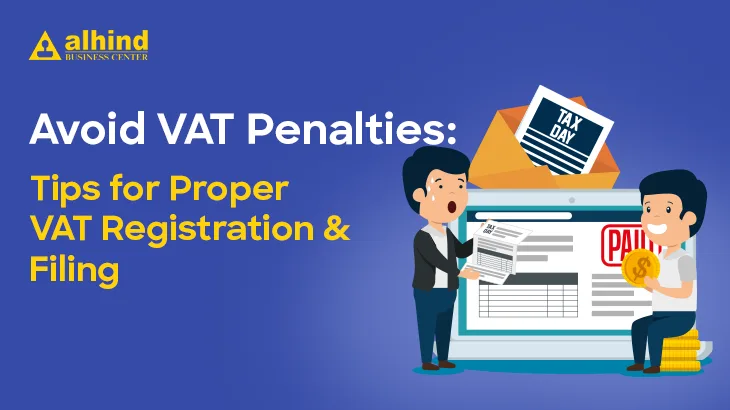Table of Contents
Value Added Tax (VAT) in the UAE is a consumption tax levied on most goods and services at a standard rate of 5%. Introduced in 2018, VAT plays a crucial role in diversifying the country’s revenue streams and supporting public infrastructure and services. For businesses operating in the UAE, VAT registration is mandatory if annual taxable supplies exceed the threshold of AED 375,000. Voluntary registration is an option for those with annual taxable supplies above AED 187,500. Compliance with VAT regulations set by the Federal Tax Authority (FTA) is not just a legal requirement; it’s essential for maintaining smooth business operations and financial credibility.
Despite its importance, many businesses face VAT penalties due to common issues such as a lack of awareness, late filing, incorrect tax calculations, or improper documentation. These mistakes can result in significant fines and reputational damage. At Alhind Business Center, we understand the challenges businesses face in navigating the complexities of VAT compliance. This blog aims to guide you through proper VAT registration and filing processes, helping you avoid costly errors and stay fully compliant with UAE tax laws.
Understanding VAT in the UAE
Before diving into compliance, it’s important to understand the basics of VAT in the UAE. Introduced in 2018 as part of the country’s economic transformation, VAT helps fund public services while reducing reliance on oil revenues. For businesses, understanding how VAT works isn’t just about following the law; it’s about protecting your reputation, avoiding penalties, and ensuring smooth financial operations. Let’s break down the key aspects every business owner should know.
What is VAT and Why It Matters for Businesses?
VAT is a 5% tax applied to most goods and services in the UAE. It’s collected by registered businesses on behalf of the government and passed on to the Federal Tax Authority (FTA). Think of it as a tax that’s added at each stage of the supply chain, but ultimately borne by the end consumer.
For example, if a Dubai-based electronics retailer sells a laptop for AED 5,000, they must charge an additional 5% VAT (AED 250), making the total price AED 5,250. The business then reports this AED 250 to the FTA during its VAT return filing.
Why does this matter? Because even if your business isn’t the final consumer, you act as a tax collector. Failure to charge, collect, or remit VAT correctly can lead to audits, penalties, and even suspension of business activities. Being VAT-compliant also builds trust with clients and partners who expect transparent and legal financial practices.
Who Needs to Register for VAT in the UAE?
Not every business must register for VAT, but many do. The UAE’s VAT law requires mandatory registration for businesses whose annual taxable supplies (sales) exceed AED 375,000. This applies to all types of businesses, LLCs, freelancers, sole establishments, and free zone companies if their activities are subject to UAE VAT.
Additionally, businesses with annual taxable supplies between AED 187,500 and AED 375,000 can choose to voluntarily register for VAT. This can be beneficial, especially if you’re paying VAT on business expenses (input tax), as registration allows you to reclaim it.
For example, consider a startup interior design firm in Abu Dhabi. In its first year, it generates AED 420,000 in billings. Since this exceeds the mandatory threshold, the firm must register for VAT within 30 days. Failing to do so can result in a penalty of up to AED 10,000.
On the other hand, a new marketing consultant earning AED 250,000 annually may not be required to register but could benefit from doing so, especially if they’re spending on office software, travel, or equipment and want to recover the VAT paid.
Common VAT Penalties Businesses Face
Even with good intentions, many businesses in the UAE fall into VAT compliance traps that result in financial penalties and operational disruptions. The Federal Tax Authority (FTA) enforces strict rules to ensure transparency and timely tax collection, and violations, even unintentional ones, can be costly. From late submissions to inaccurate reporting, the most common VAT penalties stem from avoidable mistakes. Understanding these risks is the first step toward protecting your business. At Alhind BC, we’ve seen how a lack of awareness or poor internal processes leads to penalties that could have easily been prevented with the right guidance.
Late VAT Registration
Businesses that exceed the mandatory VAT registration threshold (AED 375,000 in annual taxable supplies) must register within 30 days of crossing it. Delaying registration even by a few days can result in penalties.
The FTA imposes a late registration penalty of AED 10,000, and in some cases, additional fines based on the duration of non-compliance. Moreover, the business becomes liable to pay VAT on all sales made during the unregistered period, which can create unexpected tax liabilities.
For example, a growing IT consultancy in Dubai hits AED 400,000 in sales by August but waits until November to register. Not only is it subject to the AED 10,000 penalty, but it must also account for and pay VAT on all eligible sales from the moment it crosses the threshold, potentially leading to a large, unplanned tax bill.
Failure to File VAT Returns on Time
Every VAT-registered business must file a VAT return within 28 days after the end of each tax period (usually quarterly). Missing this deadline even by a day triggers automatic penalties.
The FTA applies an AED 1,000 penalty for the first late submission, and AED 2,000 for each subsequent late filing within 24 months. These fines accumulate quickly, especially for businesses with recurring delays.
Imagine a retail store in Ajman that forgets to file its Q2 VAT return due on July 28. By August 1, the system flags it as late, and a AED 1,000 fine is issued. If the same mistake happens the next quarter, the penalty doubles to AED 2,000. These amounts may seem small, but they reflect poor compliance and can attract further scrutiny from the FTA.
Incorrect VAT Filing or Misreporting
Submitting a VAT return with errors such as incorrect output tax, overstated input tax claims, or misclassification of supplies (e.g., treating exempt supplies as zero-rated) is a serious compliance issue.
The FTA imposes penalties based on the level of negligence:
- Minor errors: 5% of the underpaid tax (if corrected voluntarily).
- Careless mistakes: 15% to 30% of the underpaid tax.
- Deliberate misreporting: Up to 300% of the tax involved.
For example, a construction company mistakenly claims VAT on expenses related to residential property development, which is an exempt activity. Suppose the FTA discovers this during an audit. In that case, the business may have to repay the reclaimed VAT plus a 15–30% penalty, depending on whether the error was due to oversight or intentional action.
Not Maintaining Proper VAT Records
The FTA requires all VAT-registered businesses to keep complete, accurate, and organized records for at least 5 years. This includes invoices, import/export documents, bank statements, and VAT return filings.
Failing to maintain proper records can result in a penalty of up to AED 50,000. Even if your VAT returns are correct, you cannot prove compliance without documentation, putting your business at risk during audits.
For example, a food truck operator in Ras Al Khaimah uses informal receipts and deletes digital records to save space. When audited, they can’t provide proof of purchases or sales. Despite paying VAT correctly, the lack of records leads to a significant fine and reputational damage.
Non-Payment or Partial Payment of VAT
After filing a VAT return, businesses must pay the full tax due by the filing deadline. Delayed or partial payments attract financial penalties and interest.
- Late payment penalty: 2% of the unpaid amount within 7 days of the due date.
- Additional penalty: 4% if unpaid after 7 days.
- Monthly interest: 1% per month on overdue amounts.
For example, a manufacturing company files its return on time but only pays 60% of the AED 50,000 VAT liability due to cash flow issues. Within a week, a 2% penalty (AED 1,000) is added. If the balance remains unpaid, the penalty grows to 4% (AED 2,000), and monthly interest begins to accrue quickly, turning a temporary shortfall into a much larger financial burden.
Additional Risk – Lack of VAT Training or Internal Controls
While not a standalone penalty category, poor internal processes and lack of staff training are root causes behind most VAT errors. Businesses that don’t train their finance teams or implement proper accounting systems often repeat the same mistakes, leading to repeated penalties and audit risks.
At Alhind Business Center, we recommend establishing clear VAT procedures, using compliant accounting software, and conducting regular internal reviews. Proactive management can prevent errors before they occur, saving your business time, money, and stress.
Tips to Avoid VAT Penalties
Avoiding VAT penalties isn’t about perfection; it’s about being proactive, informed, and organized. Many businesses in the UAE fall into compliance traps simply because they underestimate the importance of timely actions or lack proper systems. The good news? Most VAT penalties are entirely preventable with the right approach. At Alhind BC, we’ve helped hundreds of businesses stay compliant and penalty-free. Here are practical, actionable tips to protect your business from costly mistakes:
- Register for VAT on time: Monitor your revenue closely. If you’re approaching or have exceeded AED 375,000 in annual taxable supplies, register within 30 days to avoid a AED 10,000 penalty.
- File your VAT returns before the deadline: Mark your calendar! VAT returns are due within 28 days after each tax period. Set reminders or automate alerts to avoid late submissions and penalties (AED 1,000+).
- Double-check your VAT calculations: Ensure accurate reporting of output tax, input tax, and net VAT payable. Use FTA-approved accounting software to minimize human error and misclassification of supplies.
- Keep complete and organized records: Maintain all invoices, receipts, import documents, and bank statements for at least 5 years. Digital backups and cloud storage can help you stay audit-ready.
- Pay your VAT liability in full and on time: Partial payments still attract penalties. Plan your cash flow to meet tax obligations by the due date and avoid 2–4% penalties plus 1% monthly interest.
- Invest in VAT training for your team: Equip your finance or accounting staff with basic VAT knowledge. Understanding key rules reduces the risk of errors and ensures consistency.
- Conduct regular internal VAT reviews: Perform quarterly checks on your filings, records, and compliance status. Catching small issues early prevents bigger problems later.
- Seek professional help when needed: VAT rules can be complex, especially for mixed supplies, free zone businesses, or cross-border transactions. Partner with a trusted advisor like Alhind BC to ensure full compliance and peace of mind.
By following these tips, your business can not only avoid penalties but also build a strong foundation for long-term financial health and credibility in the UAE market.
Benefits of Proper VAT Compliance
Complying with VAT regulations is more than just a legal obligation; it’s a smart business strategy. At Alhind BC, we believe that VAT compliance is an investment, not a burden. When handled correctly, it brings tangible advantages that go beyond avoiding fines. From strengthening your financial standing to boosting your professional image, proper VAT management supports sustainable growth. Let’s explore how staying compliant can work in your favor.
Avoiding Financial Penalties
The most immediate benefit of VAT compliance is the avoidance of costly penalties. Late filings, incorrect reporting, or missed registrations can result in fines ranging from AED 1,000 to AED 50,000 or even higher in cases of deliberate non-compliance. By registering on time, filing accurately, and paying liabilities promptly, businesses protect their cash flow and prevent unexpected financial setbacks. Proactive compliance ensures that your money stays in your business, where it belongs.
Enhancing Business Reputation
A VAT-compliant business is seen as professional, responsible, and trustworthy. Whether you’re dealing with government entities, investors, or international partners, being up to date with tax obligations enhances your credibility. In contrast, a history of penalties or audits can raise red flags and damage your brand’s image. Demonstrating strong compliance practices positions your company as a reliable player in the UAE’s competitive market.
Smooth Business Operations and Government Relations
Staying compliant with VAT regulations helps maintain a positive relationship with the Federal Tax Authority (FTA) and other regulatory bodies. Businesses that file on time and keep accurate records are less likely to face audits, investigations, or operational disruptions. In addition, compliance simplifies processes like license renewals, tenders, and expansion plans—many of which require up-to-date tax clearance certificates. A clean compliance record keeps your business running smoothly, without unnecessary delays.
Building Trust with Clients and Partners
Clients and suppliers often verify the VAT registration status of potential partners before entering into contracts, particularly large corporations and government agencies. Being VAT-registered and compliant signals transparency and financial discipline. It also allows you to issue valid tax invoices, enabling your customers to reclaim input tax, which makes doing business with you more attractive. This mutual benefit strengthens relationships and opens doors to new opportunities in both local and global markets.
How Business Setup Consultants Can Help
Navigating VAT regulations can be overwhelming, especially for startups, SMEs, and foreign investors unfamiliar with the UAE’s tax system. That’s where professional support makes all the difference. At Alhind BC, our expert VAT consultants don’t just help you set up your business we guide you through every stage of VAT compliance. From registration to ongoing management, we act as your trusted compliance partner, ensuring accuracy, timeliness, and peace of mind. Here’s how we add value at every step.
VAT Registration Assistance
Getting VAT registration right the first time is crucial. At Alhind BC, we assess your business activity and annual turnover to determine whether registration is mandatory or voluntary. We handle all the paperwork, including preparing financial statements, filling out FTA forms, and submitting your application with complete documentation. Whether you’re a mainland LLC, free zone company, or sole proprietor, we ensure your registration is approved quickly and without errors, saving you time and avoiding rejection risks.
VAT Filing and Return Management
Filing VAT returns accurately and on time is essential to avoid penalties. Our team takes care of the entire process: collecting your sales and purchase data, calculating output and input tax, preparing your VAT return, and submitting it to the FTA before the deadline. Using cloud-based, FTA-compliant accounting tools, we ensure transparency and precision. With Alhind BC managing your filings, you’ll never miss a due date or face late submission penalties.
Advisory on Complex VAT Cases
Not all businesses have straightforward VAT obligations. Issues like mixed supplies (taxable and exempt), zero-rated exports, intra-GCC transactions, or real estate development can create confusion. Our tax specialists provide tailored advisory services to help you correctly classify your supplies, reclaim eligible input tax, and comply with complex regulations. Whether you’re restructuring your business or entering new markets, we give you clear, FTA-aligned guidance to make informed decisions.
Ongoing Compliance Monitoring
VAT compliance doesn’t end with registration and filing. Continuous monitoring is key to long-term success. Alhind BC offers proactive compliance reviews, regular record audits, and compliance health checks to ensure your business stays audit-ready at all times. We also keep you updated on changes in VAT laws, deadlines, and FTA announcements so you’re always ahead of the curve. With our ongoing support, you can focus on growing your business while we safeguard your compliance.
Conclusion:
Staying on top of VAT registration and filing isn’t just about avoiding fines; it’s about running a smart, credible, and sustainable business in the UAE. By understanding the rules, keeping accurate records, meeting deadlines, and seeking expert help when needed, you can turn VAT compliance from a burden into a strength. At Alhind Business Center, we’re here to guide you every step of the way so you can focus on growing your business, penalty-free.
Frequently Asked Questions (FAQs)
Who is required to register for VAT in the UAE?
Businesses must register for VAT if their annual taxable supplies (sales) exceed AED 375,000. This is mandatory and applies to all business types, including LLCs, freelancers, and free zone companies engaged in taxable activities.
Can I register for VAT voluntarily?
Yes. Businesses with annual taxable supplies between AED 187,500 and AED 375,000 can choose to register voluntarily. This is often beneficial if you pay VAT on business expenses (input tax) and wish to reclaim it.
What is the deadline for VAT registration?
If your business exceeds the mandatory threshold of AED 375,000, you must register within 30 days of crossing that threshold. Failure to do so can result in a penalty of AED 10,000.
What penalties apply if I don’t pay my VAT liability on time?
Late payment penalties are:
- 2% of the unpaid amount if paid within 7 days of the due date.
- An additional 4% if still unpaid after 7 days.
- Plus, a monthly interest of 1% on the overdue amount.
Can I make a partial payment of my VAT liability?
No. Partial payments still attract late payment penalties and interest on the outstanding balance. It’s crucial to pay the full amount by the deadline.


















